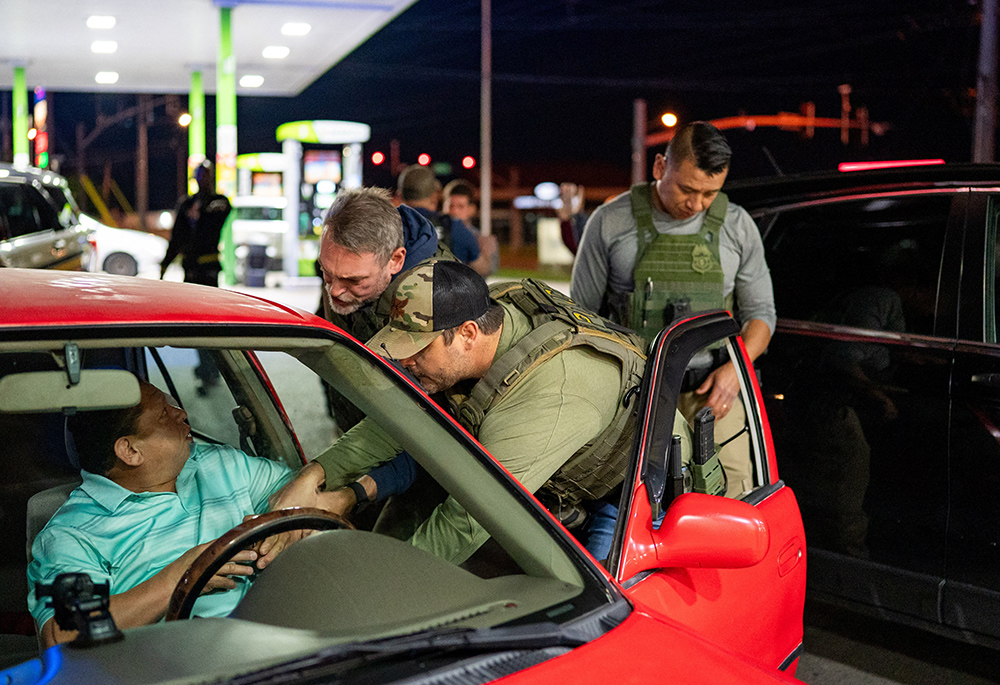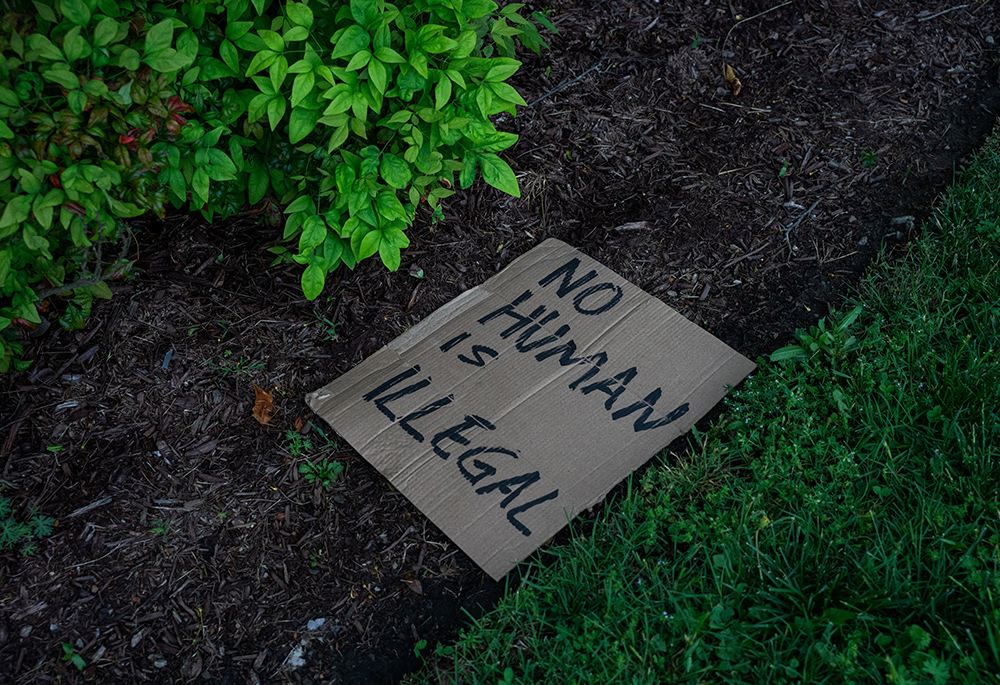
U.S. Immigration and Customs Enforcement officers detain a man from a car stopped by Tennessee Highway Patrol at a gas station in South Nashville, as he could not produce any alternative identification proof other than his expired driving license, during an operation conducted by ICE along with THP to detain noncitizens across the city of Nashville, Tennessee, on May 10, 2025. (OSV News/Reuters/Seth Herald)
There was once a king who built a golden statue so big it mocked the heavens. He called it god and demanded worship. When three exiles refused, he made them disappear — casting them into the fire. No trial. No appeal. Simply smoke and silence. His name was Nebuchadnezzar, and he believed himself divine.
This is what empire does. It erects itself in gold and violence, demanding obedience through fear. It names enemies to justify its power, turning neighbor against neighbor. And this — this isn't some old tale locked in the vaults of the Bible. No, it's the liturgy of every empire that ever dared to imagine itself immortal.
In 1973, Gen. Augusto Pinochet overthrew Chile's democratically elected president and launched a reign of terror under the pretense of restoring order and reform. He desecrated a nation in the name of salvation. And those who dared to resist? He cast them as threats, enemies. And then, they vanished. Thousands were taken — students, teachers, artists — gone without explanation. Some were tortured. Some were never found. Los desaparecidos — the disappeared, they called them.
The regime didn't just kill, it erased identities, stole information, even stripped people of their ability to mourn. Behind it all stood a legal system gutted of justice, transformed into theater where the state played judge, jury and executioner. No charges. No courts. Just whispered orders and a knock at the door. But los desaparecidos were not absent. Their presence haunted the living with empty chairs at dinner tables.
This is the anatomy of empire: not just the taking of land or bodies, but of law itself. In Argentina, the junta followed suit, disappearing about 30,000 souls. Francoist Spain rehearsed the same brutal script. And still today, modern Nebuchadnezzars walk among us, treating justice like property to be bought, bartered or buried. Yes, in Syria. In North Korea. But we'd be mistaken to think it ends there.

A sign lies on the ground after a bus with detained people left the Department of Homeland Security field office in Nashville where multiple immigrant rights groups gathered to protest what they believed to be a multi-agency operation to detain noncitizens overnight in Nashville, Tennessee, May 4, 2025. (OSV News/Reuters/Seth Herald)
As NPR reported, earlier this May in Nashville, U.S. Immigration and Customs Enforcement agents — working alongside Tennessee state police — carried out a series of traffic stops in a predominantly Latino area. ICE isn't allowed to pull people over without reasonable suspicion and, according to the American Immigration Council, "the Supreme Court has clarified that immigration enforcement is the sole duty of the federal government."
But under the banner of "public safety," they found a way to collaborate and work around the rules, and it's a script we've seen before.
A program called 287(g), expanded under the Trump administration, lets local police enforce immigration law. According to local media, troopers share people's immigration status with ICE, and ICE uses that information as "probable cause" to make arrests. In a press release, Homeland Security called the arrests a "successful operation with 287g partners in Nashville." The Tennessean reported May 14 that Tennessee Highway Patrol had a pending application for the 287(g) program, which had come as THP and ICE completed their weeklong operation.
Officials claimed to be targeting violent felons, but 101 of the 196 arrested had no criminal history whatsoever, and yet they were taken — many of them to a Louisiana detention center — without warning, without trial. It's likely that many were here legally. Some were never even given the chance to produce documentation they didn't have on hand when they were stopped. No chance to explain. Only disappearance.

An Immigration and Customs Enforcement officer looks on as a bus transporting detained people leaves the Department of Homeland Security field office in Nashville, where multiple immigrant rights groups gathered to protest what they believed to be a multi-agency operation to detain-noncitizens overnight in Nashville, Tennessee, on May 4, 2025. (OSV News/Reuters/Seth Herald)
This is not ancient history. It is empire in the present tense.
In April, President Donald Trump proposed something so surreal it nearly slipped past many of us: deporting American citizens convicted of violent crimes to prison in El Salvador. El Salvador's notorious mega-prison, CECOT, is known for its harsh and dehumanizing conditions where men are packed by the thousands into concrete cells with metal bunks and no mattresses, no windows, and no contact with the outside world — not even a lawyer.
Just before that, the world learned of Kilmar Abrego Garcia — a U.S. resident wrongfully deported and detained at CECOT despite a Supreme Court ruling demanding his return. Officials admitted he should never have been deported. Yet they refused to bring him home. No trial. No hearing. Only accusation and abandonment. Kilmar remains trapped in a theater of cruelty that trades human lives for political power.
Advertisement
Trump laughed with Salvadoran President Nayib Bukele, suggesting El Salvador might need to "build about five more places" to house the Americans sent there.
Legal experts didn't hesitate to call it what it is: unconstitutional. Sending U.S. citizens to foreign prisons without a fair trial breaks some of our most basic rights, including the Eighth Amendment, which bans cruel and unusual punishments. Our laws are supposed to mean something. They're meant to guard the dignity of every person, even the ones who've done harm. But this? This is cruelty in legal disguise. This is what dictators do: disappear people through loopholes, evading responsibility while pretending their conscience is clean.
When a nation begins discarding its own people, we have to ask: What kind of god does it believe itself to be? Because we've seen this before. When due process unravels and the law becomes a weapon instead of a refuge, tyranny takes root — and the most vulnerable are the first to be erased. But the danger runs deeper than policy. It begins in the imagination, in the belief that some lives are expendable, that some belong and others do not. When a ruler starts deciding who gets to stay, who deserves the nation, who belongs in the fire, he is no longer leading. He is playing god. And we must not look away.
When a nation begins discarding its own people, we have to ask: What kind of god does it believe itself to be?
If this becomes normal, if this becomes acceptable, then we are no longer a people governed by law — we are governed by the whims of power, plunging toward authoritarianism masked as order. Empire always comes for the exiled, because empire needs an enemy. It cannot sustain itself without someone to swallow.
Remember the three in the furnace. Shadrach, Meshach, and Abednego weren't just brave; they were a people who refused to forget who they were. They did not kneel to the idol. They stood their ground, revealing a deeper truth: fire cannot consume what is rooted in the divine. And this kind of holy defiance didn't end in Babylon.
I think of another furnace — also in Nashville, in 2019, before the raids. ICE agents showed up at a man's home, intent on taking him without a warrant, without charges. Just suspicion. For hours, he and his young son remained trapped inside their van, afraid to step outside. But then something sacred happened. Neighbors began to gather. Word spread. And soon, strangers linked arms around the vehicle, forming a human chain. They brought food. Water. Gas. They bore witness. And when the time came, they walked the father and son safely to their home, shielding them with their own bodies. No one was arrested that day. No one disappeared.
God doesn't always rescue from the fire. Sometimes, God steps into it. Often that happens through us — through marches and petitions, protests and presence. Always presence.
God doesn't always rescue from the fire. Sometimes, God steps into it. Often that happens through us — through marches and petitions, protests and presence. Always presence. Sometimes it's in standing on the front lawn. Sometimes it's in the holy audacity to interrupt injustice in real time.
Empires may rise. They may build monuments and prisons. They may wield fire. But they will never understand the power of a people who refuse to forget who they are. A people who remember the three in the furnace, who form human chains of protection, arms linked in defiant hope. A people who bear witness in love — until every exile is seen, until every neighbor is safe, until every fire becomes a place where God is found walking among us.





